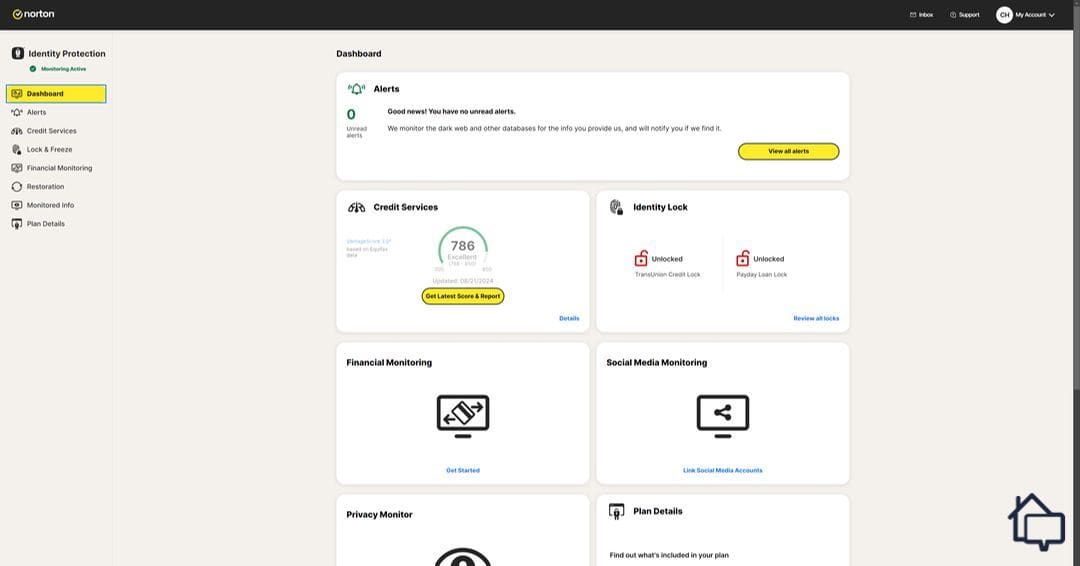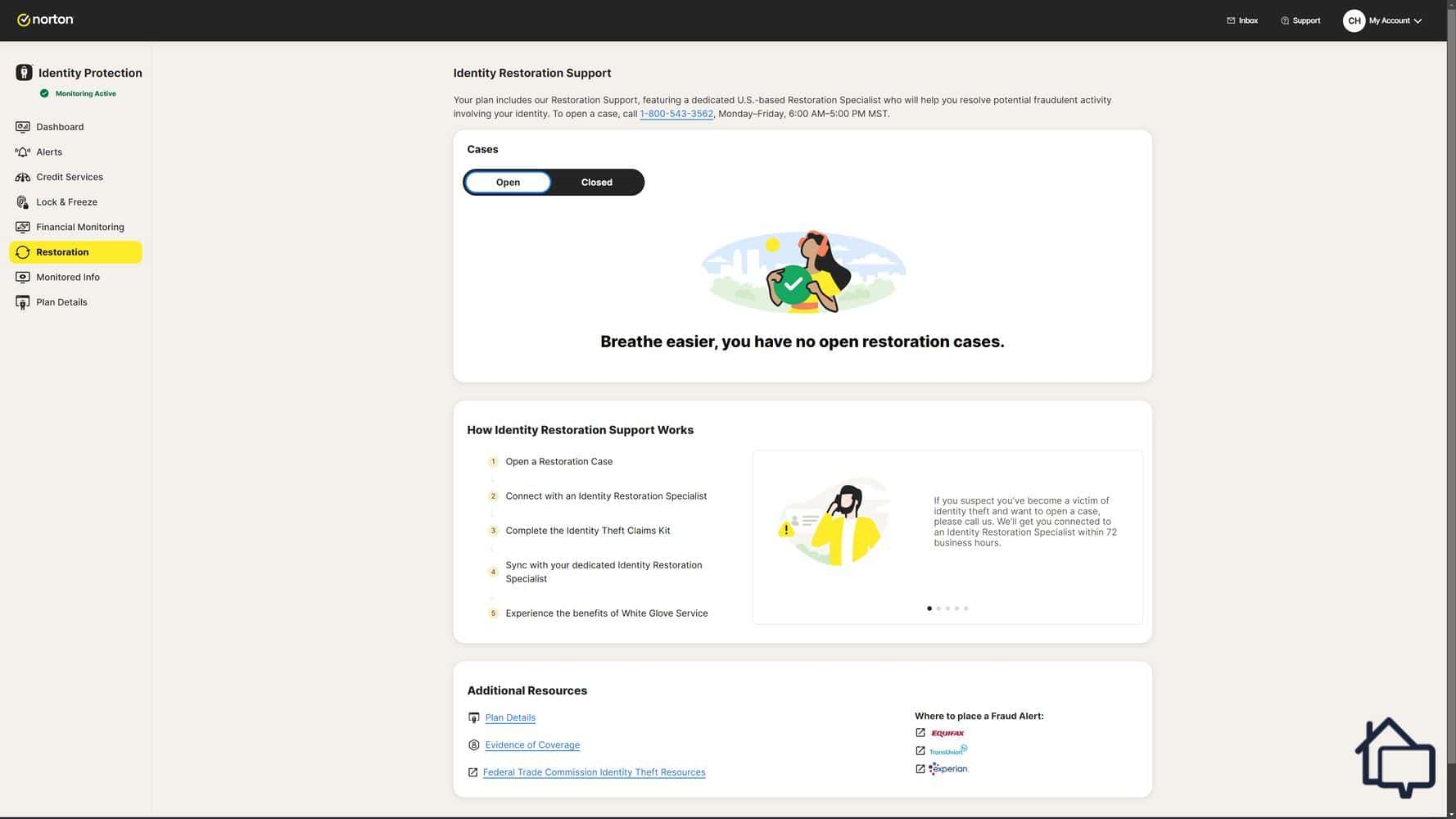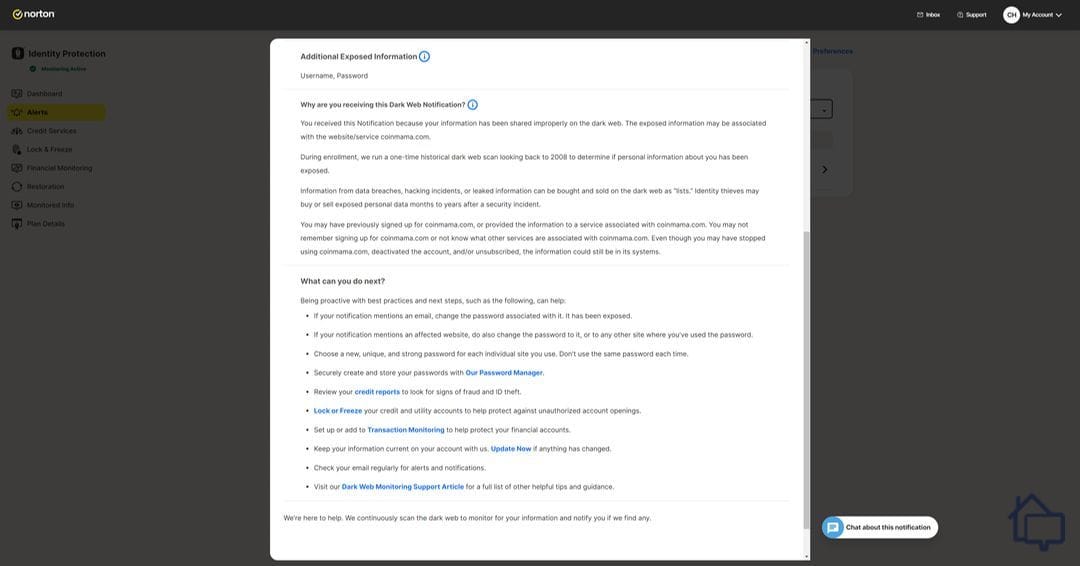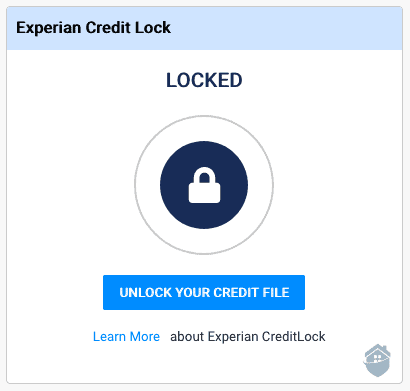We like that you can get ProtectMyID for free with a AAA membership, but paying for identity theft protection is still worth it. To show you how much more you can get with a paid plan, we compared it to our favorite identity theft protection service: LifeLock.
Just because one option is free doesn’t mean it’s the best option. That’s what we found when we tested ProtectMyID to put it head-to-head against LifeLock. We were able to get ProtectMyID’s Essential Plan completely free since we’re a AAA member, but it lacked some crucial features like three-bureau credit monitoring. Plus, it only gave us $10,000 of insurance, which kept it off our list of the best identity theft protection services.
When we tested LifeLock, it cost us about as much as ProtectMyID’s premium plan, but it included $2 million more insurance and more comprehensive monitoring. Just how much more comprehensive is LifeLock’s monitoring, though? Let’s dig in to find out.
>> Read More: A 2025 Guide to Identity Theft Protection Services
An Overview of LifeLock and ProtectMyID

You can take advantage of LifeLock’s 30-day free trial on any of their plans — just like we did.
LifeLock was founded in 2005. Since that time, the company was bought out by Symantec — the people behind Norton Antivirus. Now known as LifeLock, this identity theft protection service is one of the best on the market today, at least compared to the 20 services we’ve tested. LifeLock offers a complete range of financial and identity protection as well as a full suite of preventative cybersecurity measures.
While ProtectMyID doesn’t boast the bells and whistles of LifeLock, the service is powered by Experian — one of the three major credit monitoring bureaus whose roots can be traced back to the early 1800s. That name certainly brings with it confidence and peace of mind that your protections are as close to the source as they can be. But, closer to the source doesn’t always mean better protections, as you’ll find out shortly. It also requires a AAA membership.
Now that we’ve covered the background of each company, let’s go over the key similarities and differences between them.
Similarities Between LifeLock and ProtectMyID

ProtectMyID made it easy for us to add our information for their monitoring services.
Whether you go for LifeLock or ProtectMyID, you can expect to get some similar features and capabilities. Here are the key similarities between LifeLock and ProtectMyID:
- Social Security Number (SSN) Monitoring: The core feature of identity theft protection is SSN monitoring, which both LifeLock and ProtectMyID provide.
- Three-Bureau Credit Monitoring: It’s not included in every plan for either LifeLock or ProtectMyID, but they both offer three-bureau credit monitoring. That ensures you’ll be notified of suspicious credit activity regardless of which bureau it’s through. It’s our favorite type of credit protection.
- Credit Lock: A credit lock puts a temporary hold on a specific credit bureau file while allowing you to unlock it instantaneously. LifeLock can lock your TransUnion credit file, while ProtectMyID can lock your Experian credit file.
- Optional Child Identity Monitoring: Both LifeLock and ProtectMyID offer plans that include identity monitoring for your children too. LifeLock even made our list of the best child identity theft protection services.
- Restoration Support: If your identity gets stolen while you have an active subscription with LifeLock or ProtectMyID, they’ll provide you with an identity restoration expert who will help you recover your identity.
- Cybersecurity Tools: While we much prefer the cybersecurity tools included with LifeLock, we can’t deny that ProtectMyID offers some cybersecurity tools too.
Did You Know? You can keep an eye on all three of your credit files for free by pulling credit reports from each bureau. It’s available on a weekly basis through Annual Credit Report, although we find monthly to be adequate in most cases.1
Differences Between LifeLock and ProtectMyID

LifeLock’s clean and modern dashboard gave us an overview of our credit score, alerts, and monitoring.
Of course, there are reasons we like LifeLock better than ProtectMyID, and that’s because of their differences. We’ll start with a summary of the differences, and then we’ll dive into the details. Here are the key differences between LifeLock and ProtectMyID:
- Insurance Amount: The maximum insurance you can get from ProtectMyID is $1,000,000. LifeLock offers plans with up to $3,000,000 in insurance.
- Stolen Funds Reimbursement: If an identity thief steals money, such as by gaining access to one of your bank accounts, LifeLock offers up to $1,000,000 in stolen funds reimbursement as part of their insurance. ProtectMyID does not offer this type of protection.
- 24/7 Support: You can reach out to LifeLock’s support 24/7 either by phone or through a live chat. ProtectMyID only offers support over the phone during their business hours or by email.
- Free Plan: With a AAA membership, you can get free access to ProtectMyID’s Essential Plan, which includes $10,000 identity theft insurance and basic monitoring. LifeLock only offers paid plans.
- Availability: ProtectMyID is only available to AAA members, whereas LifeLock is available to anyone.
- Extra Monitoring Capabilities: LifeLock monitors a lot more of your information than ProtectMyID. Everything that ProtectMyID monitors, LifeLock also does. But, the latter also monitors things like your home title and investment accounts.
>> Check Out: LifeLock Free Trial Offers in 2025
LifeLock vs. ProtectMyID: A Comprehensive Breakdown
We covered the high-level overview, so you know we prefer LifeLock. Now, let’s dig into the details where we’ll discuss all the nitty-gritty aspects of both services that go into protecting your identity, as well as how much they’ll cost you, so you can pick the best option for you. There are a few cases where we’d recommend ProtectMyID over LifeLock even though most will be better off with LifeLock’s protection.
Pricing

You can use LifeLock’s 30-day free trial — just like we did — to run a complete scan of your identity with zero dollars down.
Even though we prefer LifeLock, their plans cost a bit more than ProtectMyID. In our opinion, the increased price is well worth the extra capabilities you get. The only way ProtectMyID provides more value is with their free plan, of course, and if you need credit monitoring. They offer a plan with three-bureau credit monitoring for $10.95 per month. Three-bureau credit monitoring from LifeLock costs a minimum of $19.99 per month. It offers a lot more features that we think are worth it, but some only need credit monitoring.
LifeLock’s Pricing
First, let’s go over LifeLock’s pricing. We’re not including every capability they offer in the pricing table, but we’re highlighting a few key features that separate the plans. Even with only the features we list, though, it’s still more than ProtectMyID offers. We’ll do a deeper comparison of features shortly too.
| LifeLock Services | Standard | Select | Advantage | Ultimate Plus |
|---|---|---|---|---|
| Credit Monitoring | Single Bureau | Single Bureau | Single Bureau | Triple Bureau |
| Annual Credit Report and Scores | Not Provided | Not Provided | Single Bureau | Triple Bureau |
| TransUnion Credit Lock | Not Provided | Not Provided | Provided | Provided |
| Fictitious Identity Monitoring | Not Provided | Not Provided | Provided | Provided |
| Home Title Monitoring | Not Provided | Not Provided | Not Provided | Provided |
| Identity Restoration | Up to $1 Million | Up to $1 Million | Up to $1 Million | Up to $1 Million |
| Stolen Funds Reimbursement | Up to $25,000 | Up to $25,000 | Up to $100,000 | Up to $1 Million |
| Personal Expense Compensation | Up to $25,000 | Up to $25,000 | Up to $100,000 | Up to $1 Million |
| Norton 360 | Unavailable | +$0.83 Per Month | +$2 Per Month | +$5 Per Month |
| Price | Starts at $7.50 Per Month | Starts at $7.50 Per Month | Starts at $14.99 Per Month | Starts at $19.99 Per Month |
>> Read About: Best Identity Theft Protection Services for Couples
ProtectMyID’s Pricing
There are two things we really like about ProtectMyID’s pricing. First, they offer a free plan that includes some amount of insurance. That’s a good deal, if you ask us. Second, they offer some of the lowest prices for three-bureau credit monitoring. Aside from credit monitoring, their protections are relatively basic for an identity theft protection service. Here’s an overview of ProtectMyID’s plans and pricing:
| ProtectMyID Services | Essential | Deluxe | Platinum |
|---|---|---|---|
| Credit Monitoring | Single Bureau | Triple Bureau | Triple Bureau |
| Identity Theft Insurance | Up to $10,000 | Up to $1,000,000 | Up to $1,000,000 |
| Fraud Resolution Support | Yes | Yes | Yes |
| VantageScore Tracker | No | Yes | Yes |
| SSN Monitoring | No | Yes | Yes |
| Dark Web Monitoring | No | Yes | Yes |
| Experian Credit Lock | No | No | Yes |
| Social Media Monitoring | No | No | Yes |
| Monthly Price | Free for AAA Members | $10.95 | $15.95 |
Winner: Draw
>> Learn About: Best Family Identity Theft Protection in 2025
Pro Tip: ProtectMyID’s Platinum plan includes monitoring for up to 10 children. However, it does not include identity theft insurance for them. LifeLock’s family plan costs more and only covers up to five children, but they include up to $1,050,000 insurance per child.
Insurance and Restoration

LifeLock has a dedicated page for submitting identity theft claims and restoring your identity.
So, what happens if your identity gets stolen while subscribed to LifeLock or ProtectMyID? That’s where identity theft insurance and restoration services come in. ProtectMyID offers up to $1,000,000 insurance specifically for legal fees, lost wages, and transfer fees. LifeLock offers that same insurance, but it also covers any experts needed for your case. On top of that, they include up to $1,000,000 insurance to reimburse any stolen funds and up to $1,000,000 to reimburse any personal expenses. Needless to say, we like LifeLock’s insurance more. That extra insurance is also why it’s one of our favorite identity theft protection services for businesses.
As for guidance, LifeLock and ProtectMyID both provide you with a U.S.-based identity restoration expert to guide you through the entire process of getting your identity back. They’ll walk you through everything from reporting the incident to preventing the thief from causing further damage.
Winner: LifeLock
Monitoring Capabilities

ProtectMyID’s online exposure scan found out that one of our email addresses was leaked in a data breach.
While identity theft protection services heavily advertise their insurance, we focus on their monitoring capabilities just as much. Even with identity theft insurance, we don’t want to deal with our identity getting stolen. With the best identity restoration services available, a stolen identity will still cause a massive headache. That’s why an ounce of prevention is really worth a pound of cure when it comes to protecting your identity. And, in that regard, LifeLock offers a lot more than ProtectMyID.
Here’s a comparison between LifeLock and ProtectMyID’s monitoring capabilities:
| Feature | LifeLock | ProtectMyID |
|---|---|---|
| SSN Monitoring | Yes | Yes |
| Three-Bureau Credit Monitoring | Yes | Yes |
| Social Media Monitoring | Yes | Yes |
| Buy Now Pay Later Alerts | Yes | No |
| Fictitious Identity Monitoring | Yes | No |
| Phone Takeover Monitoring | Yes | No |
| Bank Account Application Alerts | Yes | No |
| Investment Account Alerts | Yes | No |
| Home Title Monitoring | Yes | No |
This chart makes it clear how much more monitoring LifeLock offers than ProtectMyID and why we find the more expensive pricing well worth it.
Winner: LifeLock
FYI: Every LifeLock plan does not include every type of monitoring. They scale up with each tier. We recommend the Ultimate Plus plan for three-bureau credit monitoring, up to $3 million insurance, and all of their identity monitoring capabilities.
Customer Support

Every alert LifeLock sends comes with a guide for next steps and an option to chat with their experts for more guidance.
If you sign up for an identity protection service, you should expect to be able to get in contact with your provider at any time. That’s why LifeLock offers 24/7 support by phone and a live chat. We can’t say the same for ProtectMyID. They only offer phone support during their business hours, and they do not have a live chat. ProtectMyID’s business hours in CST are 8 a.m. to 8 p.m. Monday through Friday and 10 a.m. to 7 p.m. Saturday and Sunday.
It might not seem like a big deal since ProtectMyID is still available seven days a week, but we really prefer 24/7 support. You’re at an elevated risk of identity theft when traveling, and an identity theft incident when in a foreign country can cause major issues for you. And, if you’re in a different time zone, all of a sudden those normal business hours can become overnight instead of during the day. Those are the times you need support from your identity protection service the most, and, without 24/7 support, getting that help can be difficult.
Winner: LifeLock
Credit Protection

We used ProtectMyID to temporarily lock our Experian credit file.
ProtectMyID is run by Experian, one of the three major credit bureaus. As expected, their credit protection capabilities are pretty strong for affordable rates. You can get three-bureau credit monitoring for as little as $10.95 per month, and even their free plan includes monitoring for your Experian credit file. Another protection they offer is the option to lock your Experian credit file.
While LifeLock can’t necessarily beat ProtectMyID when it comes to credit protections, they at least match them. There’s three-bureau credit monitoring, albeit at a higher rate, and it includes a credit lock, except for your TransUnion credit file instead of Experian.
Winner: ProtectMyID
>> Learn More: A 2025 Comparison of Identity Theft Protection Services
Did You Know? A credit lock is different than freezing your credit. When you freeze your credit, it takes time for them to reopen your credit file, which means if you need to apply for a line of credit, you’ll need to unfreeze it ahead of time. Credit locks allow you to turn them on or off almost immediately.
LifeLock vs. ProtectMyID: The Takeaway
In case we haven’t made it clear enough, we prefer LifeLock in almost every circumstance. They provide more monitoring services which catch identity theft attempts before they cause too much harm. It also provides you with more insurance and more available customer support. Not to mention, if you’re not a AAA member, ProtectMyID is not even an option.
That said, if you are a AAA member, there are circumstances that can make ProtectMyID worth it. If you don’t have any budget for identity theft protection, ProtectMyID offers a free plan with basic protection. Or, if credit monitoring is your top priority, ProtectMyID’s plans include three-bureau credit monitoring for affordable rates. Even with that, though, we find the extra monitoring capabilities of LifeLock to be well worth the cost. If LifeLock’s not right for you, head over to our list of the best LifeLock alternatives for options with better value than ProtectMyID.
FAQs about both LifeLock and ProtectMyID
- Is ProtectMyID available to everyone? What about LifeLock?
ProtectMyID is only available to AAA members, while LifeLock is available to the general public.
- Which is more affordable, ProtectMyID or LifeLock?
If we’re talking about premiere service tiers, ProtectMyID is more affordable even when a AAA membership is factored into the equation.
- Does ProtectMyID or LifeLock offer more services?
LifeLock offers far more services than ProtectMyID, but some features might not be necessary for the average consumer.
- Will ProtectMyID and LifeLock help if my identity is stolen?
Yes, both will provide you with an identity restoration expert to guide you through the recovery process. They both also provide insurance to cover your expenses with LifeLock providing more comprehensive coverage.
- Do ProtectMyID and LifeLock monitor all three credit bureaus?
Yes, both services offer triple-bureau credit monitoring and access to all three bureaus’ credit reports — although you’ll have to pay an additional fee for TransUnion and Equifax reports with ProtectMyID.










